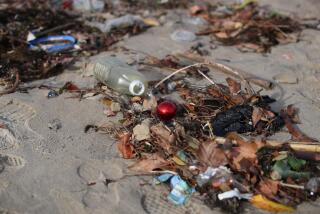Warning: Food know-it-alls can be bad for your health
- Share via
I was kicking around the Westside the other afternoon looking for a pregnant woman when I ran into Liz Williams, who is seven months along. I don’t know a lot of pregnant women, so finding Liz, who is a friend, was a stroke of good fortune. We spent a few moments talking about death and fish, and by the time we parted she looked as though dingoes had stolen her baby.
She was having dinner in a Santa Monica restaurant when I spotted her. We exchanged polite greetings and I sat down at her table, which surprised her. She was enjoying a quiet dinner and didn’t need a newspaper columnist busting in on her serenity. But I was delighted to find a pregnant woman eating fish. It worked into a column I was preparing on the Fish Enigma.
My interest began when I read that women who eat fish are 50 times less likely to suffer postnatal depression. The finding was based on a study released by the National Institutes of Health, which releases a study about every 15 minutes. It found that a new mother’s mood can be lightened by ingesting fish with a lot of omega-3 fats. Happy mothers, like happy cows, produce better milk, sort of.
As I thought about it later, I suddenly realized I had stumbled onto the Fish Enigma the way Einstein must have stumbled onto the formula that energy equals mass times the speed of light squared, or E=mc2. I was on the Hollywood Freeway when I realized that Eating Fish for Health may be Dangerous to Human Life. Or EFH=DHL.
It is based on the fact that not too long ago, while the AMA was urging us to eat a lot of fish for our hearts’ sake, the NIH and others were warning us (1) that some fish contain dangerously high amounts of mercury, which can cause deformation in unborn children and a lot of problems in born children, and (2) the big fish of the ocean are dying out because we’re eating too many of them.
What all this means is that if women eat a lot of fish, they may be happier after giving birth, but their babies may be born with deformities and we may be wiping out all the sharks, tuna and swordfish in the sea.
I pointed out the contradictions to Liz, who was eating salmon -- which, according to still other studies, contains the lowest amount of mercury. However, it also contains PCBs.
“PCBs?” Liz said between bites.
“Yes,” I said, opening a file folder. “They are polychlorinated biphenyls once used as insulating fluids in electrical transformers and are known to collect in the tissues of fish. There are also the chemicals DDT and PBDE, which have accumulated in animal fat, including fish. PCB, DDT and PBDE are dangerous to the health of human fetuses. If it doesn’t deform them, they might be born stupid. PCBs are known to reduce a child’s IQ.”
Liz put down her fork. “I only eat salmon twice a month,” she said somewhat timidly, then suddenly brightened, “and I’ve cut way back on hydrogenated oils!”
I said, “Congratulations on the hydrogenated oil decrease, but getting back to the fish question, it may become a moot point anyhow.” I shuffled through papers in the folder. “According to a new study out of Canada, commercial fishing fleets have stripped the ocean of 90% of the world’s big fish. Tuna salads are in danger of becoming extinct.”
“Well,” Liz said, trying to be cheerful, “there’s always steak! Good for protein.”
“Not exactly,” I said. “There’s always mad cow disease. That’s bovine spongiform encephalopathy, or BSE. DDT, PCB, PBDE and BSE,” I sang, in a bouncy little rhythm, bobbing my head from side to side. It was an effort to inject a little fun into our conversation. Then: “I was in London when the mad cow story broke some years ago. I thought it an amusing name. Like ‘nutty cows,’ you know?” I made a nutty cow face. “But I guess a fatal brain-wasting disease isn’t really that funny.”
“No,” Liz said tightly, “it isn’t.”
We discussed the outbreak of mad cow disease in Canada, which, who knows, could creep into the United States, polluting our dog food as well as our cheeseburgers.
“Then there’s preeclampsia,” I said, “an often fatal complication of pregnancy associated with high levels of protein. It is characterized, among other things, by proteins in the urine and ... “
“Would you excuse me?” Liz said, standing.
“You can’t check it on your own,” I said, assuming she was going to the ladies’ room. “You have to have some kind of kit to break down the ... “
“I’m not going anywhere,” she said. “But you are.”
I can take a hint. I packed my notes and left. Too bad. Liz could have learned about VEGFs and PIGFs too. Awful stuff.
*
Al Martinez’s column appears Mondays and Fridays. He’s at al.martinez@latimes.com.
More to Read
Eat your way across L.A.
Get our weekly Tasting Notes newsletter for reviews, news and more.
You may occasionally receive promotional content from the Los Angeles Times.










